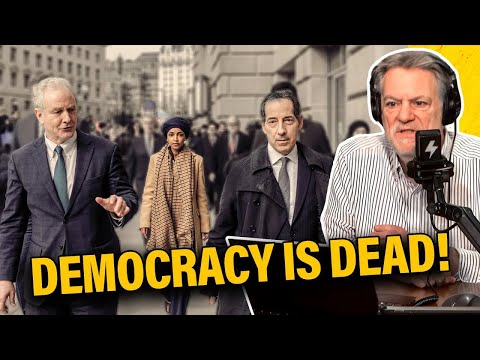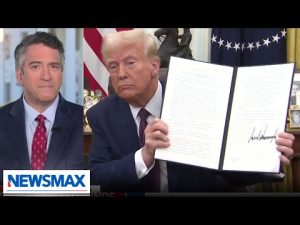**Democrats Rally Against USAID in D.C.: A Clash of Values and Perspectives**
In the heart of Washington, D.C., a scene unfolded that seemed straight out of a political drama. Democrats gathered in front of the USAID office building to express their views on U.S. foreign aid, showcasing impassioned responses to government actions. At the forefront of this gathering was the notable figure Ilhan Omar, who conveyed her deep frustrations regarding the current state of USAID, drawing from her own experiences as a child who survived a refugee camp during a civil war.
Omar’s heartfelt testimony revealed the stark importance of USAID in her life, as she explained how the agency’s essential programs provided food and safety for her family when they needed it most. She emphasized that when the world engages with America through humanitarian efforts, it fosters goodwill and a better image for the United States. According to her, military actions generally fail to evoke love and security, while aid programs show the more compassionate side of America.
However, not everyone agreed with Omar’s views. Many on the right took a stand against the current direction of USAID. They argued that while humanitarian aid is a noble cause, it should not be the responsibility of the government alone. Instead, they believe that helping those in need is a personal duty, one that should be embraced by individuals and communities, not mandated by government agencies. This perspective reflects a broader philosophy that emphasizes personal responsibility over governmental involvement in charity.
As the rallying voices of Democrats echoed their calls for compassion and support through USAID initiatives, critics pointed out the bizarre choices some programs make. Suggestions like sponsoring unconventional events were highlighted as wasteful distractions from the core mission of helping those struggling for basic necessities, like food and shelter. This sparked a debate about what the primary focus of foreign aid should be, pushing some to speculate whether the program’s efforts were losing sight of its essential objectives.
Speculation was further fueled by the mention of Elon Musk, with critics arguing about the influence of private entities on federal aid. They asserted that while figures like Musk wield significant power in various industries, they do not control the funds allocated for humanitarian assistance. The argument veered towards a cautionary stance regarding executive decisions made without proper congressional approval. Opposition voices emphasized that financial aid should remain firmly within the congressional domain, highlighting the importance of checks and balances in the government.
As the spirited discussions continued, the stage was set for an ongoing debate surrounding the future of USAID and its role in American diplomacy. The clashes between Democrats and their Republican counterparts reveal a fundamental difference in beliefs about the intersection of government responsibility and personal initiative. It remains to be seen how this tension will influence policy changes and the future of American foreign aid, but one thing is clear: these passionate discussions are not going away anytime soon. With both sides armed with their convictions, the battle over how best to represent America on the world stage is likely to heat up in the coming months.



